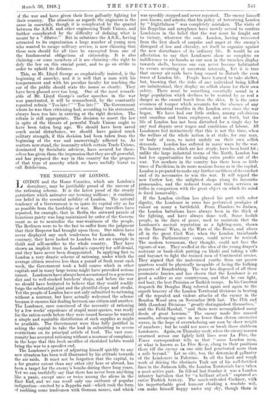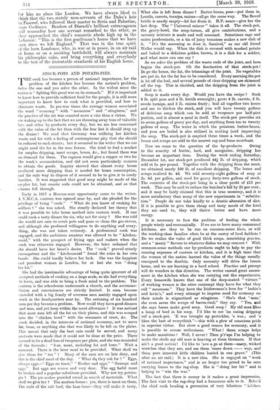THE NOBILITY OF LONDON.
y ONDON and the Home Counties, which are London's iJ dormitory, may be justifiably proud of the success of the rationing scheme. It is the latest proof of the steady patriotism which animates our teeming millions ; it confirms our belief in the essential nobility of London. The natural tendency of a Government is to spare its capital city as far as possible from the hardships of war. Many travellers have reported, for example, that in Berlin the outward parade of luxurious gaiety was long maintained by order of the Govern- ment so as to neutralize the war-weariness of the people. The Berliners were to be the last to suffer from the judgment that their Emperor had brought upon them. Our rulers have never displayed any such tenderness for London. On the contrary, they have looked to London to set an example in thrift and self-sacrifice to the whole country. They have shown an implicit trust in London's capacity for self-denial, and they have never been disappointed. In applying first to London a very drastic scheme of rationing, under which the average citizen receives less than a pound of fresh meat each week, the Government took a bold course which in other capitals and in many large towns might have provoked serious unrest. Londoners have always been accustomed to a generous diet and to well-stocked butchers' shops, and before the war we should have hesitated to believe that they would readily forgo the substantial joint and the plentiful chops and steaks. Yet the people of London have not only submitted to rationing without a murmur, but have actually welcomed the scheme because it ensures fair dealing between one citizen and another. The Londoner, once convinced of the necessity of rationing by a few weeks' experience of stupid meat-queues, was ready for the ration-cards before they were issued because he wanted a simple and equitable distribution of such supplies as might be available. The Government were thus fully justified in asking the capital to take the lead in submitting to severe restrictions on its principal article of food. The vast com- munity has accepted rationing without a murmur of complaint, in the hope that this fresh sacrifice of cherished habits would bring the war to a speedier end. The Londoner's power of adjusting himself quickly to any new situation has been well illustrated by his attitude towards the air raids. It must not be forgotten that the capital, to a far greater extent than any other city here or abroad, has been a target for the enemy's bombs during three long years. Yet we can truthfully say that there has never been anything like a panic, except once or twice among the aliens in the East End, and we can recall only one outburst of popular indignation—excited by a Zeppelin raid—which took the form rif mobbing some tradesmen with German names, and which was speedily stopped and never repeated. The enemy himself now knows, and admits, that his policy of terrorizing London by " frightfulness " was completely mistaken. The visits of his Zeppelins and aeroplanes have merely served to confirm Londoners in the belief that the war must be fought out to victory, whatever the cost. London, having recovered from the first shock of surprise and anger at the enemy's disregard of law and chivalry, set itself to organize against the new disturbance of its ordinary life. It would be an affectation to say that Londoners show as complete an indifference to air-bombs as our men in the trenches display towards shells, because one can never become habituated to events recurring at uncertain intervals. Yet it is true that enemy air raids have long ceased to disturb the even tenor of London life. People have learned to take shelter, but, knowing that the risks of any individual being killed infinitesimal, nfinitesimal, they display no selfish alarm for their own safety. There must be something essentially sound in a large population which declines to be worried by so real a danger as the casual bomb from the skies. It is the same evenness of temper which accounts for the absence of any serious industrial troubles in the London area since the war began. We have had our little strikes, among cab-drivers and omnibus and tram employees, and so forth, but the life of London has not been disturbed for a single day by any real dispute over wages and conditions of labour. All Londoners feel instinctively that this is not the time, when the welfare of the whole nation is at stake, for any man, or body of men, to insist unduly on their own selfish demands. London has suffered in many ways by the war. The luxury trades, which are her staple, have been hard hit ; unlike the large industrial towns of the North, London has had few opportunities for making extra profits out of the war. Yet nowhere in the country has there been so little trace of Pacificism in its more noxious forms as in the capital. London is prepared to make any further sacrifices of its comfort and of its necessaries to win the war. It will regard the new Curfew law, the unlighted shops along its favourite promenades, and the reduced tram and train services as trifles in comparison with the great object on which its mind is fixed immovably.
If the London civilian has played his part with sober dignity, the Londoner in arms has performed prodigies of valour on many a battlefield. From Flanders to Judaea, the London battalions have always been in the thick of the fighting, and have always done well. Some foolish people, in the days of peace, used to maintain that the Londoner's ancient reputation as a fighting-man, shown in the Barons' Wars, in the Wars of the Roses, and above all in the great Civil War, when the London trainbands saved the Parliamentary cause, could never be revived. The modern townsman, they thought, could not face the rigours of war. They scoffed at the idea of the young draper's assistant or bank-clerk putting on khaki and taking a rifle and bayonet to fight the trained men of Continental armies. They argued that the undersized youths from our poorer quarters would be physically incapable of facing the hulking peasants of Brandenburg. The war has disposed of all these pessimistic fancies, and has shown that the Londoner is as good a soldier as any countryman, and that he can fight, and beat, the best Prussian or Turkish troops. In his Carnbrai despatch Sir Douglas Haig referred again and again to the superb bravery of the London Territorial divisions in beating off the repeated and violent attacks of the enemy in the Bourlon Wood area on November 30th last. The 47th and 56th (London) Divisions "greatly distinguished themselves," said the Field-Marshal, " and there were accomplished many deeds of great heroism." The enemy made five massed assaults, advancing once in no fewer than eleven successive waves, in the hope of overwhelming our men by sheer weight of numbers ; but he could not move or break those stubborn Londoners. Again, on Thursday week, when the enemy masses swarmed across our lightly held lines near La Fore, the Times correspondent tells us that " some London men, at what is known as La Fore Keep, clung to their positions there till the enemy oa one side had penetrated more than a mile beyond." Let us cite, too, the determinr d gallantry of the Londoners in Palestine. In all the hard and rough work of driving the obstinate Turk out of his well-fortified lines in the Judaean hills, the London Territorials have taken a most active part. In Gilead last Sunday it was a London infantry battalion that by "a brilliant attack" capturcd an entire Turkish battery. The much-ridiculed Cockney, with his imperturbable good humour cloaking a resolute will, can make himself happy under any sky, though there is for him no place like London. We have always liked to t hink that the two stately men-servants of the Duke's heir in Tancred, who followed their master to Syria and Palestine, were Cockneys. Readers of Disraeli's brilliant extravaganza will remember how one servant remarked to the other, as t hey approached the chiefs romantic abode high up in the Lebanon : " This is the first gentleman's house that we have :Ten since we left England." That was in the true spirit of the born Londoner, who, in war or in peace, in an air raid at home or on a smoking battlefield, will always maintain Ms philosophic calm, and bring everything and everybody to the test of the immutable standards of his English home.



























 Previous page
Previous page